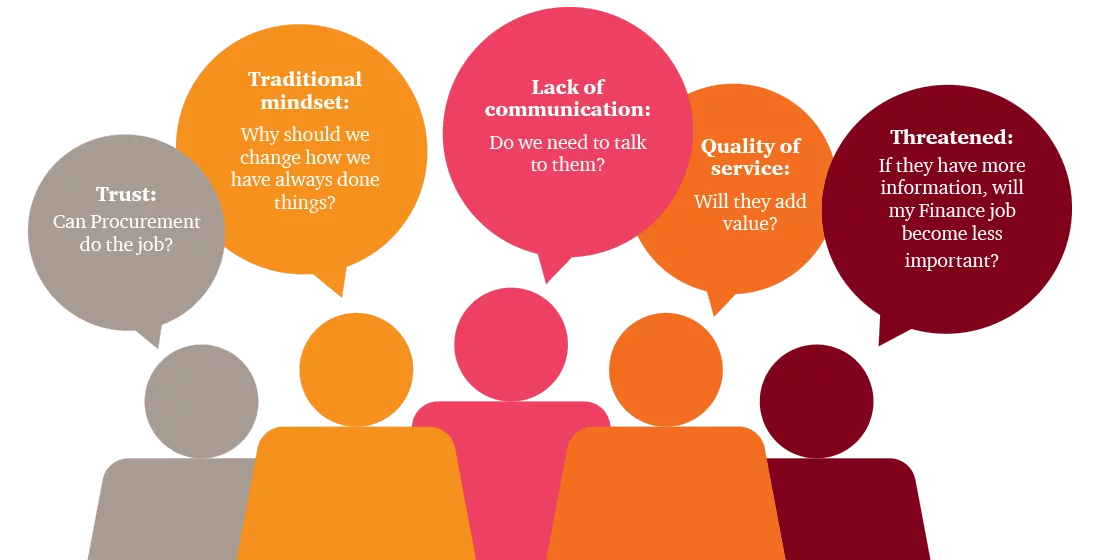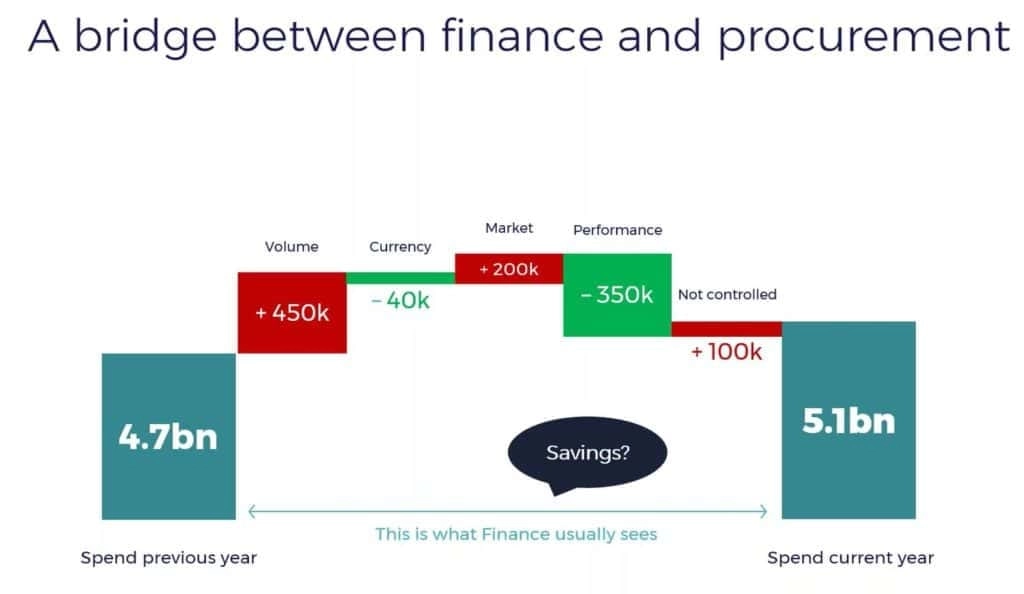Why is it important for finance and procurement collaborate departments ?
Collaboration between finance and procurement departments is essential for the long-term success of a business and to ensure that it’s achieving maximum ROI.
It might seem like a no-brainer to have your finance and procurement departments collaborating but recent studies show that these two departments often don’t have the right tools for seamless collaboration or know how important it is for them to continually collaborate. It’s essential, for the success of a business, for there to be a relationship between purchasing and finance departments. This relationship is essential for process efficiency, team structure, strategic leadership, and to know when and which technology to invest in.
As finance departments move from a back office function to become a strategic partner of the business, the procurement department must do so as well to ensure the success of the business. Finance departments were once viewed merely as the bookkeeper of the organization but companies have realized that this department is essential to their prolonged success and CFOs have become a CEOs number two in business. CFOs are no longer just bookkeepers of the business and have begun to invest time to develop a deep understanding of the business, beyond the functional requirements of the finance role.
The finance and procurement job description is to assist with strategic financial management activities including annual budget development, financial planning and cash flow, and financial reporting. When these two departments collaborate, they have better success in organizing and maintaining comprehensive financial and procurement files and ensure all recording is compliant with audit, corporate, and client requirements.
The role of finance in procurement has increased leading to a necessary collaboration between these two departments. Collaboration between finance and procurement departments leads to better savings, more informed insights, better demand planning, a better understanding of the vendor landscape, better decision-making, and less timely processes. Michael Wunderbaldinger, CFO of Tecom Group explains the relationship between purchasing and finance departments like this, “procurement and finance should be like a married couple, where they support one another through the good and bad times.”

Finance Procurement Questions (via PwC)
There are a few ways the role of finance in procurement can lead to better success in an organization. Before we take a look at the essential role of finance in procurement, let’s take a look at the common barriers to collaboration between these two departments.
Trust
Many financial departments question whether the procurement department can do their job correctly and successfully.
Traditional Mindsets
Many people have a fear of change and wonder why they should change the way they’ve always done things. This is no different for departments of organizations.
Lack of Communication
Most departments in an organization keep to themselves and wonder if it is truly necessary to talk to other departments for their own success.
Quality of Service
Another barrier to collaboration between finance and procurement departments of an organization is they wonder if the other department will add value to their work.
Threatened
Another common concern about collaboration between these two departments is if the procurement department has more information than the finance department, will finance job become less important?
Role of Finance in Procurement
While many finance professionals may fear that the procurement of funds in financial management may make their jobs less essential, it is not true. The procurement department can only add value to the finance department but only if they have seamless collaboration.
-
Agree on Cost Savings Reporting
Procurement departments often use the term ‘cost savings’ to refer to price reductions but when CFOs hear this term, they often expect to see a reduction of expenses from the previous year’s income statement to the current year’s. For these two departments to get along, it’s essential to understand that not every price reduction is reflected in the income statement in a way that CFOs are used to.
When CFOs don’t notice this type of cost savings, they often doubt the cost savings the procurement department claims. A way to avoid any misunderstanding is for the procurement department to agree with the finance department on standards and use the income statement as a way to keep score. This will make the cost savings reporting of the procurement department more believable and ensure better collaboration between the two departments.

Spend Bridge in Procurement (via Sievo)
-
Consider the Downsides of Certain Cash Flow Strategies
Organizations have been finding ways to hold onto cash longer recently and one way many CFOs accomplish this is insisting on extending supplier payment terms to 90 or more days. This may improve cash flow but it’s the procurement department that sees the consequences that the finance department may not.
These terms can lead to supplier relationships becoming strained, suppliers raising their prices to compensate for slower cash receipt, and even having fewer suppliers willing to work with the organization. By implementing a better collaboration relationship between finance and procurement departments, these departments need to construct a more balanced cash strategy that will satisfy the needs of both departments.
-
Determine a Balanced Inventory Approach
CFOs often only watch the inventory line on a balance sheet to evaluate the performance of the company and they hate to see high inventory. CFOs feel that having items sit idly on the shelf is wasting opportunities to invest cash into activities that will promote ROI (return on investment). At the same time though, the procurement department knows the operational realities of inventory like the need to make sales and continue operations through unexpected events like a spike in demand or an interruption in supply.
Another way to increase the collaboration between finance and procurement departments is to identify the inventory needed to balance operational continuity and working capital strategies. This will allow the procurement department to keep the necessary supplies on hand while satisfying the finance department’s need to increase their ROI.
-
Consider Supply Market Forces When Setting Financial Goals
The finance department sets expense goals and if these expenses involve commodity purchases, they may not have the same awareness that the procurement department has with how commodity prices fluctuate. Procurement of funds in financial management can help the organization avoid setting unrealistic financial goals that could harm them later.
-
Invest in the Right Technology
Another way a relationship between purchasing and finance departments is essential to the success of an organization is having a better understanding of when and which technology to invest in. Investing in the right technology at the right time can help improve internal processes while also improving the reputation of the business.
Technology like a vendor relationship management system can help the organization track the quality of vendors while maintaining the invoicing process electronically. When the procurement department has access to more data and insights into vendor performance, they can spend more time on providing strategic advice to the business and ensure its longtime success.
Collaboration between finance and procurement departments is essential for the success of a business and the success of these departments. Without proper collaboration, the organization is not performing as well as it could and could even be leaving money on the table. What’s the relationship between purchasing and finance departments at your organization? If they’re not seamlessly collaborating, your organization could be in trouble.




